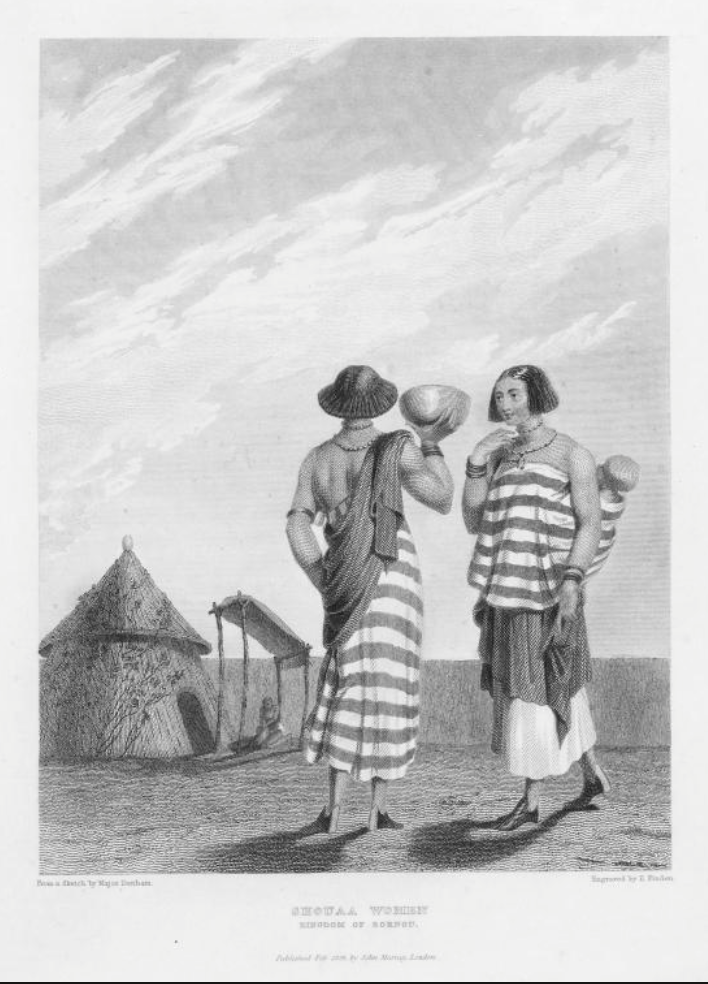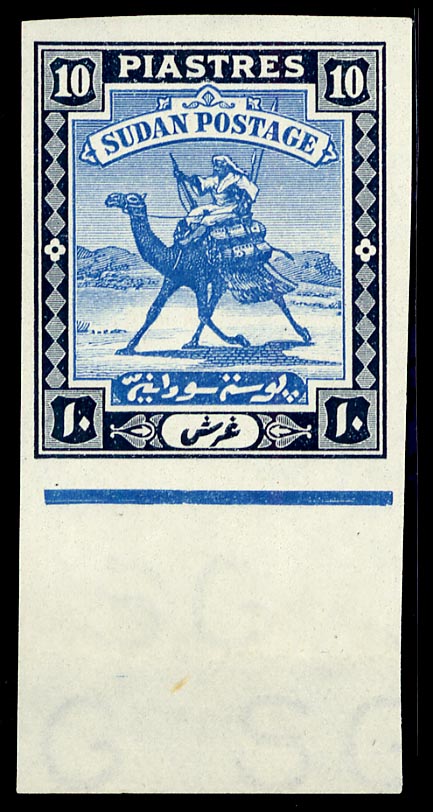|
Maqdum
''Maqdūm'' was a title in the Darfur Sultanate, roughly corresponding to "viceroy".Chris Vaughan, ''Darfur: Colonial Violence, Sultanic Legacies and Local Politics, 1916–1956'' (James Currey, 2015), pp. 39–40. It was created in the early 19th century originally for those put in charge of military campaigns against the nomadic peoples living along the periphery of Darfur. As viceroys, the ''maqdūm''s were given certain trappings of royalty at their appointment, including royal insignia, a copy of the Qurʾān, a carpet, a stool and a lance. The ''maqdūm'' had military forces at his disposal and also ''qāḍī''s (judges) in his entourage. Gustav Nachtigal, who travelled through Sudan in 1874, described the position thus: Through grants of land, which came to be seen as hereditary, and through intermarriage with local elites, the ''maqdūm''s could become closely identified with their regions. The maqdūmate of the north became hereditary. The ''maqdūm'' of the south was "a ... [...More Info...] [...Related Items...] OR: [Wikipedia] [Google] [Baidu] |
Conquest Of Darfur (1873–1874)
The conquest of Darfur by Turco-Egyptian armies in 1874 brought to an end the Sultanate of Darfur that had existed since the 16th century. It is a major event in the history of Sudan. The war began in 1873 as a proxy war fought between factions of the Rizayqat tribe living in the southern borderlands between Darfur and the Turco-Egyptian province of the Bahr el Ghazal (region of South Sudan), Bahr al-Ghazal. During this fighting, a caravan belonging to the trader al-Zubayr Rahma Mansur was attacked. After a troubled succession in Darfur in April 1873 and unsuccessful pursuit of a diplomatic solution, al-Zubayr moved against his Rizayqat rivals in southern Darfur in August. In November, al-Zubayr was appointed governor of the Bahr al-Ghazal, but he was not authorized to invade Darfur. In December 1873, troops from Darfur began moving to restore control in the south. After some successes, they were defeated and al-Zubayr occupied the city of Dara in February 1874. At this juncture t ... [...More Info...] [...Related Items...] OR: [Wikipedia] [Google] [Baidu] |
Darfur Sultanate
The Sultanate of Darfur () was a pre-colonial state in present-day Sudan. It existed from the 17th century to 24 October 1874, when it fell to the Sudanese warlord Al-Zubayr Rahma Mansur, and was reestablished again from 1898 to 1916, until it was conquered by the British. At its peak in the late 18th and early 19th century it stretched all the way from Darfur in the west to Kordofan and the western banks of the White Nile in the east, giving it the size of present-day Nigeria. History Origins Darfur is composed mostly of semi-arid plains and small seasonal rivers that cannot support a dense population. The one exception is the area in and around the Jebal Marra mountains. It was from bases in these mountains that a series of groups expanded to control the region. According to written records the Daju and the 14th century migrants the Tunjur were the earliest powers in Darfur. The transition of power from the Daju to the Tunjur was facilitated through marriage. The Fur peopl ... [...More Info...] [...Related Items...] OR: [Wikipedia] [Google] [Baidu] |
Viceroy
A viceroy () is an official who reigns over a polity in the name of and as the representative of the monarch of the territory. The term derives from the Latin prefix ''vice-'', meaning "in the place of" and the Anglo-Norman ''roy'' (Old French ''roi'', ''roy''), meaning "king". This denotes the position as one who acts on behalf of a king or monarch. A viceroy's territory may be called a viceroyalty, though this term is not always applied. The adjective form is ''viceregal'', less often ''viceroyal''. The term ''vicereine'' is sometimes used to indicate a female viceroy '' suo jure'', although ''viceroy'' can serve as a gender-neutral term. Vicereine is more commonly used to indicate a viceroy's wife, known as the ''viceregal consort''. The term has occasionally been applied to the governors-general of the Commonwealth realms, who are ''viceregal'' representatives of the monarch. The position of a viceroy is by royal appointment rather than a noble rank. An individual vicer ... [...More Info...] [...Related Items...] OR: [Wikipedia] [Google] [Baidu] |
Qurʾān
The Quran, also romanized Qur'an or Koran, is the central religious text of Islam, believed by Muslims to be a revelation directly from God (''Allāh''). It is organized in 114 chapters (, ) which consist of individual verses ('). Besides its religious significance, it is widely regarded as the finest work in Arabic literature, and has significantly influenced the Arabic language. It is the object of a modern field of academic research known as Quranic studies. Muslims believe the Quran was orally revealed by God to the final Islamic prophet Muhammad through the angel Gabriel incrementally over a period of some 23 years, beginning on the Laylat al-Qadr, when Muhammad was 40, and concluding in 632, the year of his death. Muslims regard the Quran as Muhammad's most important miracle, a proof of his prophethood, and the culmination of a series of divine messages starting with those revealed to the first Islamic prophet Adam, including the holy books of the Torah, Psalms, and ... [...More Info...] [...Related Items...] OR: [Wikipedia] [Google] [Baidu] |
Qāḍī
A qadi (; ) is the magistrate or judge of a Sharia court, who also exercises extrajudicial functions such as mediation, guardianship over orphans and minors, and supervision and auditing of public works. History The term '' was in use from the time of Muhammad during the early history of Islam, and remained the term used for judges throughout Islamic history and the period of the caliphates. While the and played the role in elucidation of the principles of Islamic jurisprudence () and the Islamic law (), the qadi remained the key person ensuring the establishment of justice on the basis of these very laws and rules. Thus, the qadi was chosen from amongst those who had mastered the sciences of jurisprudence and law. The office of qadi continued to be a very important one in every principality of the caliphates and sultanates of the various Muslim empires over the centuries. The rulers appointed a qadi in every region, town, and village for judicial and administrative contro ... [...More Info...] [...Related Items...] OR: [Wikipedia] [Google] [Baidu] |
Gustav Nachtigal
Gustav Nachtigal (; born 23 February 1834 – 20 April 1885) was a German military surgeon and explorer of Central and West Africa. He is further known as the German Empire's consul-general for Tunisia and Commissioner for West Africa. His mission as commissioner resulted in Togoland and Kamerun becoming the first colonies of a German colonial empire. The ''Gustav-Nachtigal-Medal'', awarded by the Berlin Geographical Society, is named after him. Life and travels Gustav Nachtigal, the son of a Lutheran pastor, was born at Eichstedt in the Prussian province of Saxony-Anhalt. His father died of Phthisis pulmonum in 1839. After medical studies at the universities of Halle, Würzburg and Greifswald, he practised for several years as a military surgeon. He worked in Cologne, Germany. Nachtigal contracted a lung disease and relocated to Annaba in Algeria in October, 1862. He travelled to Tunis in 1863, where he studied Arabic, and took part as surgeon in several expeditions into C ... [...More Info...] [...Related Items...] OR: [Wikipedia] [Google] [Baidu] |
Baggara
The Baggāra ( "heifer herder"), also known as Chadian Arabs, are a nomadic confederation of people of mixed Arab and Arabized indigenous African ancestry, inhabiting a portion of the Sahel mainly between Lake Chad and the Nile river near south Kordofan, numbering over six million. They are known as Baggara and Abbala in Sudan, and as Shuwa Arabs in Cameroon, Nigeria and Western Chad. The term Shuwa is said to be of Kanuri origin. The Baggāra mostly speak their distinct dialect, known as Chadian Arabic. However the Baggāra of Southern Kordofan, due to contact with the sedentary population and the Sudanese Arab camel herders of Kordofan, has led to some Sudanese Arabic influence on the dialect of that zone. They also have a common traditional mode of subsistence, nomadic cattle herding, although nowadays many lead a settled existence. Nevertheless, collectively they do not all necessarily consider themselves one people, i.e., a single ethnic group. The term "baggara culture" ... [...More Info...] [...Related Items...] OR: [Wikipedia] [Google] [Baidu] |
Ali Dinar
Muhammad Ali Dinar (; 6 November 1916), known more generally as Ali Dinar, was the last sultan of Darfur and ruler from the Keira dynasty. Ali Dinar ascended to the throne of Darfur in 1891, after his cousin, the 'shadow sultan' Abū l-Khayrāt, was killed by a band of rebellious slaves. The incident surrounding Abū l-Khayrāt's death is obscure, but some sources allege that Ali Dinar had incited his death; Ali Dinar himself denied the allegation. This period of Ali Dinar's reign was troublesome, with him ultimately being urged by his followers to enter negotiations with the Mahdists in al-Fāshir, an act which brought about raids upon him by the Masālīt and his being despoiled by Bakhīt Abū Risha of Dār Silā. Ultimately, Ali Dinar surrendered in Mahdist-occupied al-Fāshir on October 13, 1891. Initially being favorably received, Ali Dinar was later imprisoned for drinking wine. He was saved by the intercession of the ''amīr'' Maḥmūd w. Aḥmad, Mahdist governor of ... [...More Info...] [...Related Items...] OR: [Wikipedia] [Google] [Baidu] |
Anglo-Egyptian Sudan
Anglo-Egyptian Sudan ( ') was a condominium (international law), condominium of the United Kingdom and Kingdom of Egypt, Egypt between 1899 and 1956, corresponding mostly to the territory of present-day South Sudan and Sudan. Legally, sovereignty and administration were shared between both Egypt and the United Kingdom, but in practice the structure of the condominium ensured effective British control over Sudan, with Egypt having limited local power and influence. In the meantime, Egypt itself fell under increasing British influence. Following the Egyptian Revolution of 1952, Egypt pushed for an end to the condominium, and the independence of Sudan. By agreement between Egypt and the United Kingdom in 1953, Sudan was granted independence as the Republic of Sudan (1956–1969), Republic of the Sudan on 1 January 1956. In 2011, the south of Sudan itself became independent as the Republic of South Sudan. Muhammad Ali of Egypt, Muhammad Ali Muhammad Ali's rise to power, took contr ... [...More Info...] [...Related Items...] OR: [Wikipedia] [Google] [Baidu] |
History Of Darfur
Throughout its history, Darfur has been the home to several cultures and kingdoms, such as the Daju and Tunjur kingdoms. The recorded history of Darfur begins in the seventeenth century, with the foundation of the Fur Sultanate by the Keira dynasty. The Sultanate of Darfur was initially conquered in 1874 by the Khedivate of Egypt. In 1899, the government of Anglo-Egyptian Sudan recognized Ali Dinar as the Sultan of Darfur, in exchange for an annual tribute of 500 pound sterling. This lasted until Darfur was formally annexed in 1916. The region remained underdeveloped through the period of colonial rule and after independence in 1956. The majority of national resources were directed toward the riverine Arabs clustered along the Nile near Khartoum. This pattern of structural inequality and overly underdevelopment resulted in increasing restiveness among Darfuris. The influence of regional geopolitics and war by proxy, coupled with economic hardship and environmental degradati ... [...More Info...] [...Related Items...] OR: [Wikipedia] [Google] [Baidu] |






